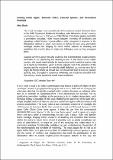Files in this item
Coming home again : Johannes Hofer, Edmund Spenser, and premodern nostalgia
Item metadata
| dc.contributor.author | Davis, Alexander Lee | |
| dc.date.accessioned | 2016-07-08T16:30:09Z | |
| dc.date.available | 2016-07-08T16:30:09Z | |
| dc.date.issued | 2017-03-25 | |
| dc.identifier | 240125901 | |
| dc.identifier | fabaa008-2d1a-4a9e-a3cd-2b447825cbc4 | |
| dc.identifier | 85028464793 | |
| dc.identifier | 000395361600002 | |
| dc.identifier.citation | Davis , A L 2017 , ' Coming home again : Johannes Hofer, Edmund Spenser, and premodern nostalgia ' , Parergon , vol. 33 , no. 2 , pp. 17-38 . https://doi.org/10.1353/pgn.2016.0073 | en |
| dc.identifier.issn | 0313-6221 | |
| dc.identifier.uri | https://hdl.handle.net/10023/9098 | |
| dc.description.abstract | The word ‘nostalgia’ was coined by the Swiss medical student Johannes Hofer in his 1688 Dissertatio medica de nostalgia, oder Heimwehe. Hofer’s treatise and Edmund Spenser’s 1595 poem Colin Clouts Come Home Againe exemplify a premodern nostalgia. Hofer moves between moments of familiarity and alienation, while Spenser’s poem offers a richly imaginative response to the Elizabethan attempt to ‘plant’ new homes in Ireland. In each case, premodern nostalgia situates the longing for home within patterns of doubling and repetition that unsettle ideas of origin and belonging even as they propagate them. | |
| dc.format.extent | 393415 | |
| dc.language.iso | eng | |
| dc.relation.ispartof | Parergon | en |
| dc.subject | PE English | en |
| dc.subject | T-NDAS | en |
| dc.subject | BDC | en |
| dc.subject | R2C | en |
| dc.subject.lcc | PE | en |
| dc.title | Coming home again : Johannes Hofer, Edmund Spenser, and premodern nostalgia | en |
| dc.type | Journal article | en |
| dc.contributor.institution | University of St Andrews. School of English | en |
| dc.contributor.institution | University of St Andrews. Institute of Legal and Constitutional Research | en |
| dc.contributor.institution | University of St Andrews. St Andrews Institute of Medieval Studies | en |
| dc.identifier.doi | https://doi.org/10.1353/pgn.2016.0073 | |
| dc.description.status | Peer reviewed | en |
This item appears in the following Collection(s)
Items in the St Andrews Research Repository are protected by copyright, with all rights reserved, unless otherwise indicated.

